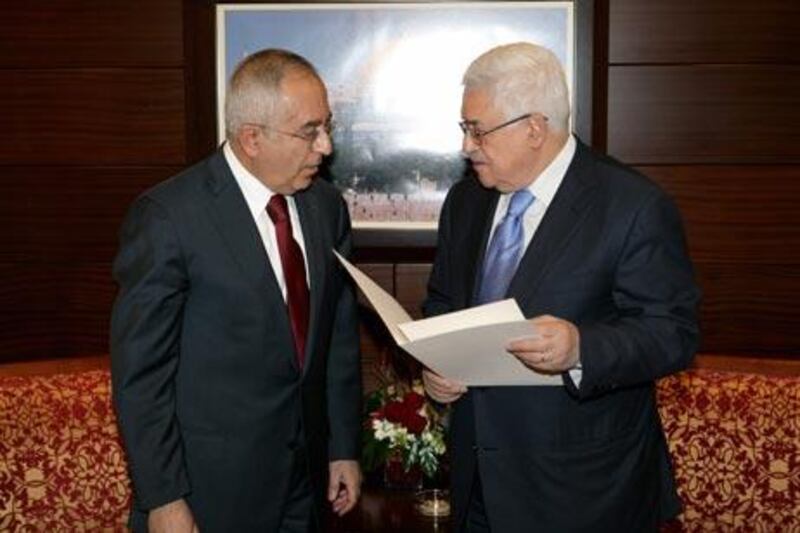TEL AVIV // The Palestinian cabinet resigned yesterday, in a move that analysts said was aimed at triggering political reforms amid leaders' concerns that the revolutions in Egypt and Tunisia could inspire mass protests by Palestinians.
Salam Fayyad, the Palestinian prime minister, dissolved his government during an emergency meeting in a shake-up intended to prepare the Palestinian leadership for general elections scheduled for this year.
Mahmoud Abbas, the Palestinian president, accepted the resignation and Mr Fayyad, who is expected to retain his post as prime ministerr, now has six weeks to appoint new members to his cabinet.
A spokesman for the Palestinian Authority (PA), Ghassan Khatib, denied that the reshuffle was tied to the mass demonstrations in Egypt and Tunisia, but analysts said the timing proved the opposite.
"The timing came with the revolution fever," said Mahdi Abdul Hadi, the director of the Jerusalem-based Palestinian Academic Society for the Study of International Affairs. "The Palestinian government is no exception to all the Arab regimes that are facing accusations of corruption and calls for change."
The dismantling of the cabinet of the Palestinian Authority, which is based in the West Bank town of Ramallah, comes just days after Mr Fayyad said long-overdue parliamentary and presidential elections would be held by September.
The last such vote was held in 2006 and has since been delayed because of the split between the Palestinian leadership in the West Bank, dominated by Mr Abbas's secular Fatah movement, and the Islamic Hamas rulers in the Gaza Strip. The PA also announced local elections would be held in July.
The PA has faced mounting criticism because of its inability to reconcile with Hamas. Fatah lost control of Gaza in 2007 when its forces were routed by Hamas in a civil war that ended a political partnership between the two factions after Hamas's victory in the 2006 elections.
Mr Abbas's government has the financial and political backing of the US and other western countries. Hamas is regarded by Israel and the US as a terrorist organisation.
Nevertheless, the PA has increasingly drawn domestic condemnation for being dysfunctional in its operations and ineffective in advancing the goal of a Palestinian state in its years-long talks with Israel.
The authority has also been riddled by other scandals. Its chief peace negotiator, Saeb Erekat, who has been a key player in talks with Israel since the 1991 Madrid Peace Conference, resigned on Saturday after conceding that embarrassing revelations about Palestinian positions in past peace talks were leaked from his office.
Mr Erekat claimed the classified documents had been "stolen" from his office and broadcast by the Al Jazeera television network to show Palestinian leaders making unprecedented concessions towards Israel and receiving little in return. The memos showed that Palestinian negotiators were prepared to give up claims to all but one Jewish settlement in occupied East Jerusalem and agree to accept the return to Israel of only 100,000 Palestinian refugees out of several millions who lost their homes when the country was created in 1948.
An aide to Mr Fayyad said the prime minister was planning to include members of Mr Abbas's Fatah movement in the cabinet, as well as members of smaller Palestinian factions and independent technocrats.
It was not clear yesterday whether Mr Fayyad, a US-educated economist, would try to draw Hamas into the new cabinet, which is expected to continue governing only the Israeli-occupied West Bank, where the Palestinians have partial self-rule.
Hamas has said it would not allow any election to take place in Gaza and would not recognise the vote's results. It has also accused Mr Abbas of attempting to win popularity without making real attempts at political reform or reaching reconciliation between the two warring factions.
"Unless Mahmoud Abbas carries out serious security and political reforms, his authority will be subject to the wrath of the Palestinian people," said Sami Abu Zuhri, a Hamas spokesman in Gaza.





